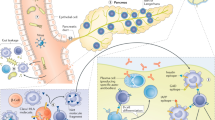Abstract.
Type 1A diabetes is an organ-specific autoimmune disease resulting from destruction of insulin-producing pancreatic β-cells. The main susceptibility genes code for polymorphic HLA molecules and in particular alleles of class II MHC genes (DR, DQ and DP). Polymorphisms of individual genes outside the MHC also contribute to diabetes risk but recent evidence suggests that there are additional non-HLA genes determining susceptibility linked to the MHC. It is now possible using genetic and autoantibody assays to predict the development of type 1A diabetes in the majority of individuals, and trials of diabetes prevention are underway.
Similar content being viewed by others
Author information
Authors and Affiliations
Corresponding author
Additional information
Received 1 November 2006; received after revision 27 November 2006; accepted 8 January 2007
Rights and permissions
About this article
Cite this article
Jahromi, M.M., Eisenbarth, G.S. Cellular and molecular pathogenesis of type 1A diabetes. Cell. Mol. Life Sci. 64, 865 (2007). https://doi.org/10.1007/s00018-007-6469-4
Published:
DOI: https://doi.org/10.1007/s00018-007-6469-4




